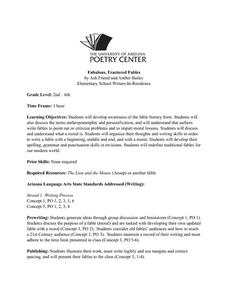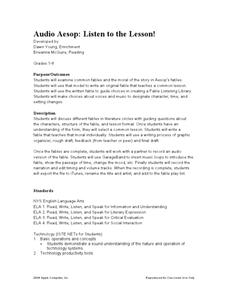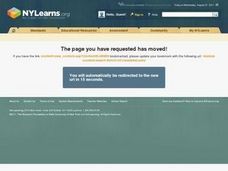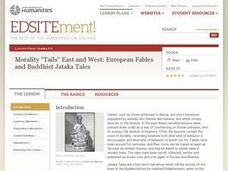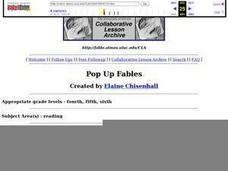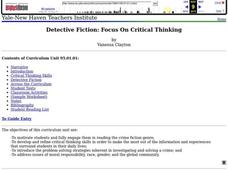Curated OER
Fables
Third graders discover characteristics of fables by reading Aesop's fables and performing a reader's theater.
Curated OER
Fabulous, Fractured Fables
Elementary schoolers develop an awareness of the literary form known as the fable. They explore how authors write fables to pass along moral lessons. After reading and discussing many famous fables embedded in the plan, learners attempt...
Curated OER
Teaching The Great Gatsby with the New York Times
East Egg, West Egg, the Valley of Ashes, and the green light. Bring Gatsby, the Jazz Age, and the American Dream to your classroom with a resource designed for teachers. Included in the treasury are six great teaching ideas for F. Scott...
Asian Art Museum
Telling Tales with Kamishibai
Kamishibai (paper drama), is a Japanese form of storytelling that uses emakimono (paper picture scrolls), to relay a moral lesson. As part of a series of resources that examine Japanese art and artists, learners watch a video retelling...
NASA
Einstein and His Times
Scholars research and present on the historical happenings of 1919. After sharing their findings, pupils debate about how Congress dealt with the moral issues of the time. The evaluation asks learners to write a persuasive essay...
Curated OER
Audio Aesop: Listen to the Lesson!
Aesop's Fables are the focus of this language arts instructional activity. Young philosophers study and discuss the morals found in the most famous of Aesop's Fables. They write an original fable that teaches a common moral. A "Fable...
Curated OER
What is a Fable?
Students read a variety of electronic Aesop's fables to define fable and moral, and write and illustrate an original fable. They then publish their fable using PowerPoint.
Curated OER
The Noble Eightfold Path
Students gain an introduction to Buddhist teachings about moral behavior by exploring a depiction of the Buddha and by writing a speech inspired by their interpretation of the Noble Eightfold Path.
Curated OER
Different Strokes For Different Folktales
Young readers use graphic organizers, such as Venn diagrams and story maps, to analyze a variety of folktales and the elements of a story. They use writing, sequencing activities, and creative art to identify the morals learned from a...
Curated OER
Folktale Writing
Review literary analysis techniques with this reading lesson about folktale writing. Middle schoolers read different folktales from many authors, and write their own folktales to share with the class. They identify the plot, morals and...
Curated OER
What Would You Do?
Young scholars explain how we all face tough decisions everyday. They show how they respond to those events reveals who they are and where they are in their character/moral development. Students predict how to deal with peer pressure and...
Curated OER
Small Actions with Big Results
Students explore philanthropy in literature. In this literature lesson, students read text from three different genres that all have a moral. Students compare and contrast these pieces of literature, focusing on the character traits that...
Curated OER
Morality "Tails" East and West: European Fables and Buddhist Jataka Tales
Have your class explore Buddhist Jataka Tales to compare and contrast them to European fables. After defining fables, Jataka tales, and the elements of each, learners identify themes and patterns for both types of narratives and the...
National Center for Case Study Teaching in Science
Bad Blood
When it comes to science and medicine, ethics should always be a primary consideration; unfortunately, that has not always been the case. There are countless examples throughout history of questionable medical practices, marginalized...
Curated OER
Pop Up Fables
Learners read a fable and create a pop-up book of the fable. Students add the moral of the story to the back of the book.
Curated OER
Earth Ethics: Moral Puralism
Students analyze an environmental policy decision. Students describe the difference between consequence-based and duty-based ethics. Students argue the case for giving standing or consideration to values other than those of human...
Curated OER
The Cold War Warrior Defending: The Moral Beacon of the World
High schoolers identify President Reagan's domestic and foreign policy, describe America's attitude toward communism, list characteristics which endeared Reagan to the American people, and explain why some Americans spoke out against...
Curated OER
Moral Dilemmas of the Ramayana
Twelfth graders explain the concept of dharma and appreciate differences in moral reasoning. They relate the Ramayana to their own experiences.
Curated OER
A Fish Tale Fable
Students identify the moral in a fable. For this folktale lesson, students read an included book, Fish Tale, and identify the message in the book. Students discuss what kind of lessons can be learned from reading this fable.
Curated OER
How Bad Are They?
Learners consider a moral dilemma and state their response in English. They practice using a conditional phrase "if...then"
Curated OER
Shaping the News
High schoolers explore television journalism. In this journalism lesson, students discuss the attributes of television broadcasting. High schoolers then review their journalism code of ethics and then conduct research for stories that...
Curated OER
Detective Fiction: Focus On Critical Thinking
Turn your 6th graders into detectives while growing their love of reading. Using critical thinking skills, they will be able to describe the five basic elements of detective fiction, read detective novels, make predictions, use the...
Curated OER
How to Write a Bibliography
Have your class learn to write a bibliography. First they are introduced to bibliographies and their purpose. Then, they examine what information must be included in their bibliography. In the end, they write a bibliography of their own.
University of Virginia
Analyzing Social Commentary in The Adventures of Huckleberry Finn
The Adventures of Huckleberry Finn continues to be one of the most frequently banned books. The satire and social commentary present challenges when using the book as a core text. Direct readers' attention to how Twain uses plot,...
Other popular searches
- Morality
- Morals Fables
- Moral Dilemmas
- Morals and Ethics
- Moral of Story
- Moral of a Story
- Moral Responsibility
- Moral Reasoning
- Moral Behavior
- Christian Morality
- Moral Courage
- Catholic Morality



